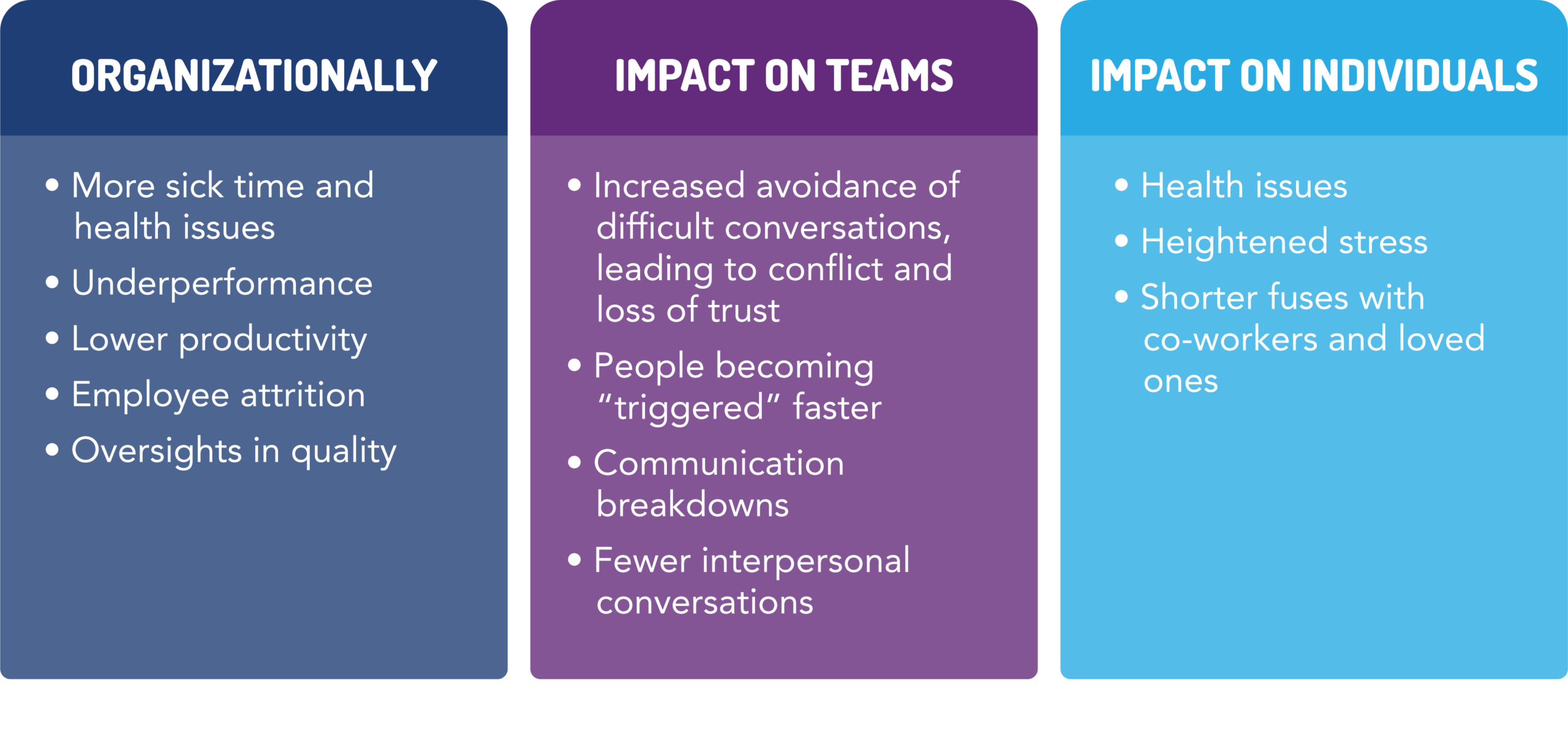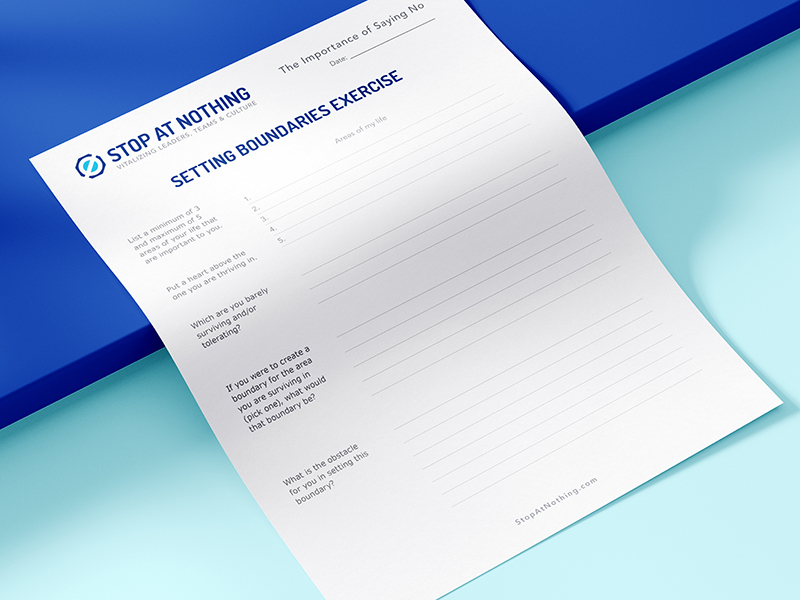By Cecilia Calderón – September 2021
Overload, exhaustion, and burnout are not badges of honor or status symbols; they are signs of an unhealthy workplace. When our default answer to every request is set to yes, we usually end up overextended and resentful. So, how can we begin building healthier boundaries? In this blog post, Cecilia takes a look into one of the most important aspects of self-care: saying no.

In our current world, filled to the rim with overload, burnout, high stress, and diminished work-life balance, the day-to-day impact is clear:
 With all this becoming increasingly apparent in our everyday lives, “self-care” has emerged as the topic du jour to reduce burnout and increase work-life balance.
With all this becoming increasingly apparent in our everyday lives, “self-care” has emerged as the topic du jour to reduce burnout and increase work-life balance.
So what is self-care?
Well, self-care can be many different things. It’s usually defined as “the practice of taking an active role in protecting one’s well-being and happiness, in particular during periods of stress.”
In this post, I explore an aspect of self-care often forgotten among the most commonly suggested self-care activities and practices—one I find has the power to significantly move the needle in reducing burnout and increasing work-life balance.
Some of the most common self-care practices mentioned are getting enough sleep, exercising, eating healthy, using vacation time to fully disengage, delegating, and all sorts of pampering. Don’t get me wrong, all these activities are excellent—however, setting clear boundaries is rarely on this list, and it is the ultimate form of self-care.
In my experience, what deeply and profoundly gets in the way is our relentless predisposition to say ‘yes’ to others and ‘no’ to ourselves.
Changing this, of course, isn’t easy. It’s easier to give in to fear and the opinions of others in a quest for approval. We end up saying yes when, internally, we want to say no. Being very intentional to what we say yes to, and more importantly, what we say no to is a critical skill. Why is this so hard to practice when, ultimately, we’re sacrificing family, friends, and our health?
How to get started
First thing first—overload, exhaustion, and burnout are not badges of honor or status symbols; they are signs of an unhealthy workplace. As leaders, it is important to watch for how we model boundary setting. Do you do it well yourself? (Check out our setting boundaries exercise to find out) Do you reinforce or punish boundaries set by others?
When our default answer to others’ requests, wishes, and demands, is set to yes, we usually end up overextended and resentful. This overextension and resentment manifest in behaviors that diminish our effectiveness as leaders, partners, parents, and every other area of our lives.
Take a hard look in the mirror and acknowledge how much the opinion of others matters to you. I am not saying that it shouldn’t matter entirely—we all need connection and working collaboratively is important. The key question here is: Are you there for others at the expense of being there for yourself?
When we give to others what we do not have for ourselves, that’s where the trouble begins. We put constraints on the parts of life that truly make us happy and help us thrive.
If we dig a bit deeper, we can extract some of the reasons so many of us are on a permanent over-commitment treadmill:
Belief Systems
Many of us have strong belief systems tied into how much we do and the value we bring to others. We want to be perceived as team players, collaborative, and helpful. We see saying no as a sign of weakness, and we end up saying yes to things we want to say no to.
Perfectionism
Many of us confuse excellence with perfectionism. We want to bring our best selves—a noble desire—but we cloud this by adding in the opinion of others. We end up exhausted, with work that does not necessarily add value and leaves us without time for anything else.
Perfectionism is not self-care. On the contrary, perfectionism is externally focused and all about the opinion of others. Excellence, on the other hand, is internally focused. It is about giving our best while maintaining a healthy desire for our own goals and values.
FOMO (Fear of Missing Out)
The fear of missing opportunities for development or acknowledgment can quickly propel us into over-commitment. A healthy balance of FOMO can lead us to learn new things, make new relationships, and find new jobs. However, if left unchecked, it can lead us to over-commitment and little time for our goals, families, and ourselves.
Building healthier boundaries
- Get clear on your values.
What are your top two or three values? How do you bring them to life in the day-to-day? Do you use them as a filter to make decisions? Do you know when you step outside of them? When things get tough, do a values inventory. Your values will shine a light on your decision-making. - Begin practicing (and sticking to) little no’s.
Be very clear and intentional about what you say yes to and, more importantly, what you say no to. Our most prized resource is not time, it is our attention. When we feel overwhelmed, our attention is diminished.Some examples of how to say no:
• “Thanks for asking. It sounds like a great opportunity. Can I have some time to think about how it fits into my upcoming deadlines?”
• “Right now I’m overcommitted and won’t be able to give this the time it deserves.”
• “Can you approach me again on this in a few weeks? I am very busy right now.”
• “It’s really hard for me to say no, but I have to this time.”Remember, a gracious decline isn’t a rejection of that person. It just means you do not have the energy to expend on this project at this time.
- Another way of saying no is being clear with what is ok and what is not ok.
Setting boundaries is not selfish. It is about clarifying what is ok and what is not ok and giving the reason why.
For example:
• “I wanted to let you know that I have made a commitment to my family in the evenings, and I will not be accepting meeting invites after 6:00 pm.”
• “I am okay receiving emails on evenings and weekends. However, I will not be answering them until Monday morning. If it is an emergency, please call me. If you do call, I will know it’s an emergency and that I must answer.”
• “I know this is a hard conversation. Being upset is ok, yelling is not.”
• “This has been a long meeting and we are all tired. Feeling impatient is ok, interrupting people is not.”
If others do not know where the line is, they may keep overstepping over it. Setting clear boundaries is important for projects, and teamwork, to function.
A final, and important, practice to bringing self-care to life is to find time every day to be with yourself and escape our usual roles. Take the time to step away to sit with yourself, process, and decide what really matters.

